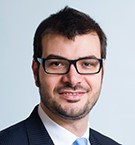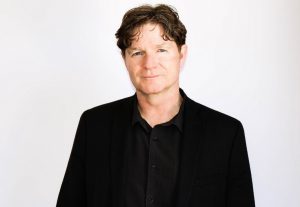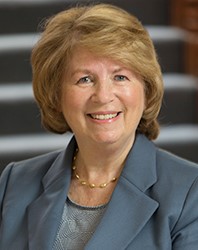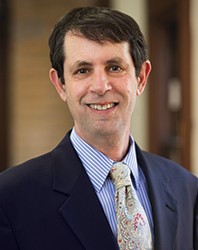K12 Mentors
Eden Evins, MD, MPH
Founding Director, MGH Center for Addiction Medicine; Cox Family Professor of Psychiatry in the Field of Addiction Medicine, Harvard Medical School
aeevins@mgh.harvard.edu
617-643-4679
Dr. Evins is a clinically trained psychiatrist with consecutive funding since 1999 as PI on NIDA-funded projects to conduct studies of the efficacy of pharmacotherapeutic cessation aids in smokers with and without serious mental illness, and of the effect of nicotine on cognitive performance in those with and without schizophrenia. She has also conducted NIDA-funded studies of behavioral, physiologic, and fMRI-ascertained assessments of impulsivity, risk-taking, reactivity to drug-related cues and the relationships between cue reactivity, attentional bias, and relapse to drug use. A newer line of investigation explores the effect of cannabis on neural markers of reward and social influence, psychiatric symptoms, cognitive function, and addictive behaviors, and the impact of different maintenance treatments for opiate use disorder on relapse and cognitive functioning.
Dr. Evins is an international expert in co-occurring substance dependence and psychiatric illness, with landmark work in treatment of nicotine dependence among those with schizophrenia and bipolar disorder. Dr. Evins brings invaluable expertise in conduct of clinical treatment trials in those with psychiatric (particularly schizophrenia and bipolar disorder) and substance use (particularly nicotine, cannabis and opiate use disorders) to the mentor team of the K12. She has conducted large, multi-center clinical studies in addition to and often integrated with laboratory-based and neuroimaging studies. She serves as the Cox Family Professor of Psychiatry in the Field of Addiction Medicine, as the Founding Director of the MGH Center for Addiction Medicine, as Director of the MGH Addiction Research Program, and as MGH site director for the Harvard Addiction Fellowship Program that provides clinical specialty training to three addiction psychiatrists per year. In the course of this work, she has gained considerable administrative expertise in the critical issues of standardized assessment, project feasibility, regulatory aspects of clinical research, ethical conduct of clinical research, human subjects protection, and practical issues of staffing, recruitment, budgeting, and communication. She has a track record of completing studies and producing several peer-reviewed publications from each project. She has successfully mentored many junior investigators in patient-oriented addiction research who are now clinical and research leaders. Her goal is to assist junior investigators with a range of backgrounds and interests, including 1) investigators with a primary focus on patient-oriented addiction research, 2) investigators from other specialties (e.g., medicine, pharmacology, neuroscience, neuropsychology) who seek to integrate addiction research into their specific fields, and 3) investigators working in related fields who can benefit from her knowledge and experience.
Her primary goal in mentoring residents, post-doctoral fellows, and junior faculty is to foster their independent research. She has worked closely with Dr. Rigotti since 2001, and they have co-mentored trainees. She devotes significant professional time to the mentorship of the next generation of patient-oriented addiction researchers.
Nancy A. Rigotti, MD
 Founding Director, Tobacco Research & Treatment Center; Associate Chief, Division of General Internal Medicine, Massachusetts General Hospital; Professor of Medicine, Harvard Medical School
Founding Director, Tobacco Research & Treatment Center; Associate Chief, Division of General Internal Medicine, Massachusetts General Hospital; Professor of Medicine, Harvard Medical School
nrigotti@partners.org
617-724-3548
Dr. Rigotti is a general internist with research training and expertise in clinical epidemiology, clinical trials, outcomes research, implementation science, and tobacco control policy. She is Professor of Medicine at Harvard Medical School and MGH, Associate Chief of the MGH Division of General Internal Medicine, and former president of both the Society for Nicotine and Tobacco Research and the Society of General Internal Medicine. Her research goal for more than 30 years has been to reduce the toll of tobacco-related disease by identifying innovative tobacco cessation treatments, by promoting delivery of effective tobacco cessation treatment in the health care delivery system in the U.S. and globally, and by evaluating the impact of tobacco control public policies. Using randomized controlled trials and observational studies, she has demonstrated the effectiveness of tobacco treatment interventions offered to smokers in the context of hospitalization, outpatient primary care, prenatal care, and specialty practice (e.g., cardiology, oncology), as well as system-level population health outreach. She has recently extended this work to incorporate health care system interventions to other addictive drug use. Dr. Rigotti has conducted clinical trials of FDA-approved or investigational smoking cessation pharmacotherapies, including bupropion, varenicline, rimonabant, and a nicotine vaccine.
Dr. Rigotti served as a scientific editor for the 1989 U.S. Surgeon General’s Report on Smoking. Her early epidemiologic studies demonstrated the dramatic rise in tobacco use by young adults in the 1990s, bringing attention to a previously ignored group. She conducted some of the first formal evaluations of smoke-free public policies and restrictions on youth access to tobacco. More recently, she has studied tobacco cessation interventions globally and investigated the impact of electronic cigarettes on smoking cessation. Dr. Rigotti founded and directs MGH’s multi-disciplinary Tobacco Research and Treatment Center. It combines an institutionally-funded MGH clinical service with an externally-funded research group that conducts projects to identify and implement effective tobacco cessation interventions in the health care delivery system. Her pioneering role and outstanding research was recognized in 2015 with the highest award for research given by the Society of General Internal Medicine, the John Eisenberg National Award for Career Achievement in Research. She is also an elected member of the American Association of Physicians. She served on the Institute of Medicine committee creating the 2015 report on agent-based modeling for tobacco control and the 2018 National Academies of Science, Engineering, and Medicine’s FDA-commissioned report on the health risks and benefits of electronic cigarettes. She has been continuously funded as PI for over 30 years on grants awarded by NIH and foundations. Dr. Rigotti has extensive mentoring experience previously supported by a K24; she has mentored over 30 trainees from internal medicine, pediatrics, family medicine, and psychiatry. Many of her trainees have secured career development awards and R01s and have progressed to leadership positions in academic medicine in the U.S. and abroad. Dr. Rigotti also serves as Director of the MGH’s Office of Women’s Careers which supports academic career advancement for female faculty.
Margarita Alegria, MD
Chief of the Disparities Research Unit, Massachusetts General Hospital; Professor of Medicine and Psychiatry, Harvard Medical School
malegria@mgh.harvard.edu
617-724-4987
Dr. Alegria is dedicated to understanding and improving health services, and eliminating health and health care disparities through state of the art research methods and innovative statistical approaches. She leads a dynamic team of clinicians, policy analysts, health economists, and statisticians who address questions regarding health service delivery, health policy, and public health using epidemiology, systems and organizational theory, economics and financing, and qualitative and quantitative methods. She is a member of the National Academies (formerly the Institute on Medicine) and leads major funded projects, including a National Institute on Aging (NIA)-funded intervention, a William T. Grant Foundation (WTGF)-funded project, and a National Institute of Mental Health (NIMH)-funded project.
Travis Baggett, MD, MPH
Associate Professor of Medicine, Harvard Medical School; Assistant Physician in Medicine, Massachusetts General Hospital; Director of Research, Boston Health Care for the Homeless Program
tbaggett@mgh.harvard.edu
617-643-9314
As a faculty physician-investigator in the MGH Division of General Internal Medicine (DGIM), Dr. Baggett maintains an active portfolio of community-based research focusing on the health and health care needs of people experiencing homelessness, with particular attention to the burden, consequences, and management of tobacco use and other substance use disorders in this population. He is the PI of two ongoing, externally-funded, full-scale behavioral intervention trials at Boston Health Care for the Homeless Program (BHCHP), each listed below. He is the recipient of several institutional awards in recognition of his innovative scientific contributions, including a recent five-year intramural award in support of a new line of work focusing on innovative strategies to improve outcomes among people experiencing homelessness with opioid use disorder. As MGH Site Director of the HMS T32 Fellowship in General Medicine and Primary Care, he has developed a track record of mentoring fellows and junior faculty who are interested in improving the health of vulnerable and hard-to-reach populations.
Ingrid V. Bassett, MD, MPH
Infectious Disease Unit, Massachusetts General Hospital; Associate Professor of Medicine, Harvard Medical School
ibassett@mgh.harvard.edu
617-726-0637
Dr. Bassett has been working in South Africa since 2004 and has developed strong collaborations and infrastructure in Durban and Cape Town for performing clinical research related to HIV and tuberculosis (TB). She has established multiple clinical cohorts in South Africa requiring long-term follow-up, including a cohort of patients enrolled prior to HIV testing to evaluate linkage to HIV care. She was among the first to document high acceptability and uptake of HIV testing but poor rates of linkage to CD4 count testing and ART initiation and played a central role in quantifying early steps in the HIV care cascade in sub-Saharan Africa. She completed the Sizanani trial, a randomized trial to evaluate the efficacy of a health system navigator in improving linkage to HIV care and TB treatment completion at four clinical sites in Durban (R01 MH090326). Dr. Bassett has been working in Umlazi Township since 2011, when she began to collaborate with AIDS Healthcare Foundation/iThembalabantu Clinic to evaluate mobile, community-based HIV testing. She is currently assessing the impact of South Africa’s Central Chronic Medicine Dispensing and Distribution program (R01 MH114997) in Umlazi using the RE-AIM framework. Dr. Bassett also works as an Infectious Disease physician at Massachusetts General Hospital. Dr. Bassett has mentored more than 15 predoctoral and postdoctoral investigators, including several K awardees performing implementation science research. Dr. Bassett is the recipient of the 2015 HIV Medicine Association Research Award and the 2013 Harvard Medical School Young Mentor Award.
Joan A. Camprodon-Gimenez, MD, PhD
Chief, Division of Neuropsychiatry; Director, Transcranial Magnetic Stimulation (TMS) Clinical Service; Director, Laboratory for Neuropsychiatry & Neuromodulation, Massachusetts General Hospital; Associate Professor of Psychiatry, Harvard Medical School
jcamprodon@mgh.harvard.edu
617-724-5600
Dr. Camprodon is the Chief of the Division of Neuropsychiatry at Massachusetts General Hospital and an Associate Professor of Psychiatry at Harvard Medical School. Clinically, he is the founding director of the MGH Transcranial Magnetic Stimulation (TMS) Clinical Service, a member of the Psychiatric Neurosurgery Committee and an attending physician in the departments of Psychiatry (Neuropsychiatry) and Neurology (Cognitive and Behavioral Neurology). He is board-certified in Psychiatry and Behavioral Neurology & Neuropsychiatry.
Scientifically, he directs the Laboratory for Neuropsychiatry and Neuromodulation. His research uses multimodal combinations of neuroimaging and brain stimulation to investigate neural circuitry and plasticity in a translational manner. His laboratory works with a wide range of noninvasive and invasive neuromodulation techniques including transcranial direct current stimulation (tDCS), transcranial magnetic stimulation (TMS), electroconvulsive therapy (ECT), and deep brain stimulation (DBS), among others. He also uses functional and structural MRI, electroencephalogram (EEG), and innovative simultaneous combinations of TMS and tDCS with neuroimaging. Dr. Camprodon is interested in understanding basic circuit properties of human neural networks and how maladaptive plastic changes lead to neuropsychiatric disorders. Critical efforts are geared towards applying the paradigms and methods of basic systems neuroscience to develop high-impact clinical tools, identify targets for therapeutic action, and design individualized image-guided neuromodulation treatments.
Kenneth Freedberg, MD, MSc
Director of the Medical Practice Evaluation Center at Massachusetts General Hospital; Director of the Program in HIV Epidemiology and Outcomes Research at Harvard University Center for AIDS Research (CFAR)
kfreedberg@mgh.harvard.edu
617-724-8597
Dr. Freedberg focuses on evaluating clinical outcomes and cost-effectiveness of care in the U.S. and globally. He has developed widely-used computer models of disease to incorporate epidemiologic, clinical, and cost data. The focus has been on HIV, TB, and other infectious as well as non-infectious chronic diseases. He has used these models to determine the cost and cost-effectiveness of different strategies for HIV care in the US as well as in countries in Europe, Africa, South America, and Asia. This research has informed clinical guidelines for HIV and other diseases. For the past 20 years, Dr. Freedberg has served as Program Director for the National Institute of Allergy and Infectious Diseases (NIAID)-sponsored T32 Program in AIDS Clinical Research Training. He has served as a mentor to over 22 post-doctoral trainees and four pre-doctoral trainees. Sixteen of these trainees have received federal funding, including K01, K23, K24, K25, R01, and R37 awards. He received the Clifford A. Barger Mentoring Award at Harvard Medical School for his commitment to mentoring young investigators.
Jodi Gilman, PhD
Director of Neuroscience, Center for Addiction Medicine; Associate Professor, Harvard Medical School
jgilman1@mgh.harvard.edu
617-643-7293
Dr. Gilman is a highly productive neuroscientist, and her research uses multi-modal imaging, behavioral and cognitive testing to understand the biological, psychological, and clinical aspects of addiction. Specifically, she uses brain imaging and cognitive and behavioral methods to understand different stages of substance use, from initiation to maintenance to recovery. Dr. Gilman is one of the leading experts on the effects of marijuana on the brain and on cognition in young adults, and has been PI on a several NIDA-funded grants, including a K01 to study the neuroscience of peer influences and marijuana use in college students, a K02 to use big data to understand the brain changes in addiction in a large longitudinal dataset, and three R01s to study medicinal properties of cannabinoids. She has expertise in neuroimaging of both pharmacological reward and incentive/affect reward, resulting in a detailed understanding of the neural circuitry underlying reward and motivation, especially in adolescents and young adults. Dr. Gilman has successfully mentored pre-doctoral students who are now pursuing PhDs in neuroscience in excellent laboratories around the country.
John F. Kelly, PhD
Elizabeth R. Spallin Associate Professor of Psychiatry in Addiction Medicine, Harvard Medical School; Founder and Director, Recovery Research Institute (RRI) at Massachusetts General Hospital (MGH); Program Director, Addiction Recovery Management Service (ARMS) at MGH; Associate Director, MGH Center for Addiction Medicine
jkelly11@mgh.harvard.edu
617-643-1980
Dr. Kelly is a former President of the American Psychological Association (APA) Society of Addiction Psychology, and is a Fellow of the APA and a diplomate of the American Board of Professional Psychology. He has served as a consultant to U.S. federal agencies such as the White House Office of National Drug Control Policy (ONDCP), the Substance Abuse and Mental Health Services Administration (SAMHSA), and the National Institutes of Health (NIH), as well as to foreign governments and national non-federal treatment institutions such as the Hazelden Betty Ford Foundation and Caron Foundation.
His clinical and research work has focused on addiction treatment and the recovery process, mechanisms of behavior change, and in reducing stigma and discrimination among individuals suffering from addiction. He has published more than 200 peer-reviewed articles, reviews, and chapters in the field of addiction science and is currently an associate editor for several academic journals in the addiction field. His work has been supported by R01 and R21 awards from the National Institute on Alcohol Abuse and Alcoholism (NIAAA) and the National Institute of Mental Health (NIMH), and he received a K24 award from NIAAA to support mentorship of junior investigators in patient-oriented addiction research.
Douglas Levy, PhD
Associate Professor of Medicine, Harvard Medical School
dlevy3@mgh.harvard.edu
617-643-3595
Dr. Levy studies how policies in public health, healthcare finance, and health services can improve primary and higher order prevention to improve population health. The principal applications of this overall research agenda are the study of policies to reduce the harms of tobacco use and the design and implementation of policies to improve food choice. In tobacco research, he has assessed public policies to reduce secondhand smoke including smoking bans in multiunit public housing. He also has a secondary research interest in using cost-effectiveness methods to help prioritize resource use and understand competing incentives to adopt alternative policies. His goal is to find effective and efficient strategies to address the leading preventable causes of death. Dr. Levy is the PI and/or Co-I of several smoking policy-related grants including a NHLBI-funded project, and an NHLBI R01 led by Dr. Rigotti.
Bertha K. Madras, PhD
Psychobiologist, Division of Alcohol and Drug Abuse, McLean Hospital; Professor of Psychobiology, Harvard Medical School;
Founding Chair of the Division on Neurochemistry, Harvard Medical School
bertha_madras@hms.harvard.edu
617-855-2406
Dr. Madras led a multidisciplinary, collaborative team of experts in medicinal chemistry and drug design, molecular and cell biology, behavioral biology, and brain imaging to investigate psychoactive and therapeutic drug mechanisms in nonhuman primates and humans, focusing on dopamine signaling systems and medication development, cloning of multiple drug targets, and genotype/phenotype associations. The goal was to clarify immediate and downstream targets of psychoactive drugs and develop novel diagnostic and therapeutic strategies to alleviate the burden of neuropsychiatric disorders. She holds 19 US and 27 international patents. She served as Deputy Director for Demand Reduction in the White House Office of National Drug Control Policy, a position confirmed unanimously by the US Senate.
In government service, she focuses on public health challenges of addictive disorders, especially those related to cannabis and opioid use. She has organized three White House medical education conferences and convened government groups to educate healthcare providers on the need to identify and intervene with at risk patients and to raise awareness of the trajectory and consequences of current opioid prescribing practices. At the Office of National Drug Control Policy (ONDCP), she initiated policy and grant initiatives, including Screening, Brief Intervention, and Referral to Treatment (SBIRT), and made state medical licensing boards and medical associations aware of the need to educate physicians on the consequences of vastly increased opioid prescriptions. Her complex portfolio included oversight of National Highway Traffic Safety Administration (NHTSA) drug policy, where she supported rapid publication of their research into roadside testing of multiple drugs/metabolites and a research program to determine the relationship between blood and saliva drug levels and prevalence of accidents. She now leads a preclinical research program focused on contrasting responses of the adolescent and adult brain to drugs of abuse (e.g., THC and psychostimulants) and serves as a consultant on cannabis and other drugs for the U.S. Department of Justice, the CDC (SBIRT), the Vatican, and the World Health Organization (WHO). She authored a definitive report on the medicinal uses of cannabis (Dec. 2015) and co-authored the 2016 report on the health and social effects of cannabis for the WHO Expert Committee on Drug Dependence.
Conall O’Cleirigh, PhD
Director of Behavioral Medicine and Associate Director of the Global Division’s T32 Fellowship at Massachusetts General Hospital; Assistant Professor of Psychiatry, Harvard Medical School
cocleirigh@mgh.harvard.edu
617-643-0385
Dr. O’Cleirigh’s principal research interest is in adapting cognitive behavioral techniques for psychiatric and substance use disorders, with an emphasis on HIV prevention and treatment, supported by grants from NIDA, NIMH, NICHD, and NIAID. In the past eleven years he has mentored 38 pre- and post-doctoral fellows, six of whom he continues to mentor as post-doctoral fellows, and eight of whom are now faculty members at Harvard Medical School or hold Assistant Professor Faculty positions in psychology departments or research medical centers throughout the country.
Elyse Park, PhD, MPH
Director of Behavioral Research, Tobacco Research and Treatment Center at Massachusetts General Hospital; Associate Director of Survivorship Research and Psychosocial Services for the Mass General Cancer Center Survivorship Program; Director of Behavioral Research, MGH Benson-Henry Institute for Mind Body Medicine; Associate Professor of Psychiatry (Psychology), Harvard Medical School/Mongan Institute for Health Policy Center
epark@mgh.harvard.edu
617-724-6836
Dr. Park’s research focuses on improving and integrating behavioral health treatment among cancer populations and populations at risk for cancer, especially tobacco users. She develops motivational and mind-body interventions for smoking cessation and chronic stress. She has an extensive portfolio of research integrating tobacco cessation interventions into clinical settings, including prenatal care, lung screening, and her current R01 on smoking cessation integrated into cancer care. She is also an expert in qualitative research design and directs the Qualitative and Mixed Methods Research Unit at the MGH Division of Clinical Research. She is active nationally in many expert panels on tobacco cessation in cancer care including the Steering Committee for Smoking Cessation Initiatives at NCI Cancer Centers, the American Society of Clinical Oncology’s Tobacco Taskforce, and the National Comprehensive Cancer Network’s Guidelines for Smoking Cessation.
Krishna Reddy, MD, SM
Assistant Professor of Medicine, Harvard Medical School; Attending Pulmonary and Critical Care Physician, Massachusetts General Hospital
kpreddy@mgh.harvard.edu
617-726-1993
Dr. Reddy’s research focuses on the intersection of tobacco use, HIV, and tuberculosis (TB). He applies methods of mathematical modeling, clinical epidemiology, and cost-effectiveness analysis to address policy-relevant questions. His overarching goals are the design, development, and application of evidence- and model-based approaches to clinical decision-making and public health policy around tobacco, HIV, and TB.
Dr. Reddy is a faculty investigator in the Medical Practice Evaluation Center research group and the Tobacco Research and Treatment Center, both at MGH. His US-focused research involves mathematical modeling of tobacco- and nicotine-related behaviors, clinical and economic outcomes, and cessation interventions. Supported by a K01 award from NIH, he developed a novel mathematical model (Simulation of Tobacco and Nicotine Outcomes and Policy [STOP]) to study clinical and economic outcomes of tobacco use and cessation among diverse populations. Dr. Reddy’s international-focused research involves modeling of TB care strategies and the intersection of tobacco control, HIV, and TB. He received an R01 award to use modeling approaches to evaluate clinical and economic outcomes of tobacco use and cessation, HIV, and TB in South Africa.
Dr. Reddy’s research brings together collaborators with expertise in policy-relevant simulation modeling and in tobacco and nicotine epidemiology and control. He has previously mentored predoctoral and postdoctoral fellows in simulation modeling research, resulting in two peer-reviewed publications.
Randi Schuster, PhD
Director of Neuropsychology and Principal Investigator, Center for Addiction Medicine; Assistant Professor, Harvard Medical School

rschuster@mgh.harvard.edu
617-643-6673
Dr. Schuster is a licensed, child-trained neuropsychologist. She uses a multi-disciplinary approach to define the biological and environmental determinants of adolescent nicotine, cannabis, and alcohol use and mechanisms underlying development of problem substance use. She has aimed to understand cognitive predecessors of adolescent cannabis and tobacco use, effects of cannabis and tobacco use on cognitive performance, and how these and other factors, such as genetics and environment, impact treatment engagement, treatment response, and functional outcomes. She has completed studies in adolescents and young adults with and without psychiatric illness using EMA, behavioral, physiologic, and neuroimaging approaches to define acute and residual effects of cannabis, tobacco, and alcohol on cognition, mood, and drug withdrawal. Her training in community-based research is reflected in her extensive ties with public schools and colleges in Greater Boston. She has surveyed over 10,000 students in school-based settings about their substance use behaviors. She is currently funded by a NIDA K23 grant to define the time course and degree of neurocognitive recovery during one month of cannabis abstinence in non-treatment seeking high school students who use cannabis at least weekly. She has enrolled nearly 300 adolescents in this six week, nine-visit protocol in which participants are randomly assigned to contingency management that incentivizes cannabis abstinence or a monitoring control with no abstinence requirement. To date, her team has conducted nearly 2,700 study visits for this project, with a retention rate of 85%.
Jordan W. Smoller, MD, MS, ScD
Associate Chief for Research, Department of Psychiatry; Director of Psychiatric Genetics and of the Psychiatric and Neurodevelopment Genetics Unit and the Precision Medicine Unit, Center for Genomic Medicine; Director of the Omics Unit of the Division of Clinical Research Program, Massachusetts General Hospital; Professor of Psychiatry, Harvard Medical School; Professor of Epidemiology, Harvard School of Public Health
jsmoller@partners.org
617-724-0835
Dr. Smoller leads a research program focused on understanding the genetic and environmental determinants of psychiatric disorders through large-scale genomic/biomarker studies of neuropsychiatric phenotypes, including the international Psychiatric Genomics Consortium (PGC). A strong interest is the biologic/genetic basis for high rates of comorbidity between psychiatric and addictive disorders such as schizophrenia and tobacco dependence. He has extensive experience with the design and conduct of psychiatric genetic studies, including behavioral and neuroimaging intermediate phenotype studies, as well as gene-environment interaction analyses.
Roger D. Weiss, MD
Chief of the Division of Alcohol and Drug Abuse, McLean Hospital; Professor of Psychiatry, Massachusetts General Hospital
rweiss@mclean.harvard.edu
617-855-2242
Dr. Weiss is an international expert in co-occurring substance use disorder and psychiatric illness, with landmark work in treatment of substance dependence among those with bipolar disorder and treatment of prescription opiate use disorder. Dr. Weiss brings invaluable expertise in conduct of clinical treatment trials in those with psychiatric (particularly bipolar) and substance use disorders (particularly alcohol and opiate use disorders) to the mentor team of the K12. He serves as director of the Partners HealthCare Clinical Addiction Psychiatry Fellowship Training Program, with Dr. Evins as the MGH Site Director of the fellowship training program. The fellowship, which trains three addiction psychiatrists per year, will be a source of highly promising K12 Scholar candidates. Dr. Weiss serves as a PI of the New England Consortium Node of the NIDA Clinical Trials Network, in which Dr. Rigotti is a co-investigator, and will be able to provide superb mentored clinical research opportunities in this capacity. Dr. Weiss has research collaborations with Drs. Lukas, Janes, and Kelly on the Program faculty.
Timothy E. Wilens, MD
Co-Director, Center for Addiction Medicine; Chief, Division of Child and Adolescent Psychiatry

twilens@mgh.harvard.edu
617-643-3481
As a child/adolescent, adult, and addiction psychiatrist, Dr. Wilens has a longstanding research interest and experience in the prevention, developmental manifestation, course, treatment, and neurobiology of substance use disorders as it relates to child and adult psychopathology such as Attention-Deficit/Hyperactivity Disorder, sleep/restless leg syndrome, severe mood dysregulation/bipolar disorder/depression, conduct disorder and psychiatric/cognitive comorbidity such as nonverbal learning disabilities. He also has longstanding interests in the treatment outcomes of these disorders alone and in comorbid states both short and long term. Dr. Wilens is further interested in examining at both a micro- and macro- level, the prevention of the onset of substance use and its manifestations such as opioid use disorders and overdose; as well as its treatment. He has also been involved in developing and testing embedded care models of SUD and other behavioral health treatment in primary and specialty care behavioral, pediatrics, and general primary care practices to help prevent, identify, and treat opioid and other substance use disorders.
Jonathan P. Winickoff, MD, MPH
Director of Pediatric Research, Tobacco Research and Treatment Center, Massachusetts General Hospital; Professor of Pediatrics, Harvard Medical School
jwinickoff@mgh.harvard.edu
781-487-4340
Dr. Winickoff’s research focuses on interventions to promote tobacco cessation among family members of children seen in pediatric practice and reduce children’s tobacco smoke exposure. He is the scientific developer of the CEASE intervention, designed to address tobacco control in families by changing clinical pediatric practice. He also studies the impact of tobacco control policies such as raising the tobacco sales age to 21 and adopting smoke-free policies for multiunit housing. He can offer mentorship for scholars working at the individual, institutional, and policy levels on tobacco interventions in pediatric practice and tobacco control policy evaluation. Dr. Winickoff currently mentors two pre-doctoral and two post-doctoral trainees. Dr. Rigotti was his primary research mentor in training and continues to collaborate with him.
Andrea Ciaranello, MD, MPH
Associate Professor of Medicine; Director, Perinatal Infectious Disease Program
Dr. Ciaranello is Associate Professor of Medicine at Harvard Medical School (HMS), an infectious disease clinician, and a clinical investigator at Massachusetts General Hospital (MGH). As founding Director of the Perinatal Infectious Disease Program at MGH, she provides clinical care to patients with HIV and a wide range of other infections during pregnancy. In her research, she has developed computer simulation models to address critical clinical and policy questions in the care of women living with HIV and their children. She has led the widely cited CEPAC-P (Cost-effectiveness of Preventing AIDS Complications-Pediatric) research team in the development of a uniquely detailed computer simulation model encompassing pregnancy and pediatric HIV disease. This pediatric HIV modeling team has published more than 90 peer-reviewed manuscripts related to scale-up of services for HIV-infected adults, pregnant women, and children, and has presented this work to key policymakers, including at the World Health Organization (WHO) and other implementing agencies. She has served as PI or leading Co-Investigator on successfully funded awards from NIAID (K01 AI078754), NICHD (R01 HD079214), multiple clinical trials networks and pediatric health foundations, and the WHO. She has led model- based analyses to inform WHO HIV care and treatment guidelines since 2013. In recognition of this work, Dr. Ciaranello received the HIV Medicine Association Research Award in 2019 and the MGH Research Scholar Award in 2022. Dr. Ciaranello has formally mentored 38 trainees at 5 institutions in the US and internationally; she received the HMS Young Mentor Award in 2016. Dr. Ciaranello also serves as Co-Chair of the US DHHS Panel on Treatment of HIV in Pregnancy and Prevention of Perinatal Transmission, a role in which she has further opportunity to evaluate current data on HIV in pregnancy and pediatrics and translate these data into policy recommendations. Her expertise in simulation modeling has also been recognized by her roles as invited member of the UNAIDS Technical Reference Group on Pediatric HIV Modeling and Estimates and by selection of the CEPAC-P team to conduct annual WHO/UNAIDS global pediatric antiretroviral drug forecasting. She and her research team have demonstrated a strong record of success in clinical disease modeling; of working alongside clinical trial, observational, and programmatic teams to conduct cost-effectiveness analyses and translate this work into health policy; and of training and mentoring junior investigators in model-based methods and to thrive in the field of HIV research.
Abigail Batchelder, PHD, MPH
Associate Professor, Departments of Psychiatry and Department of Medicine, Boston University Chobanian & Avedisian School of Medicine, Boston, MA; Director of Behavioral Health Equity Program, Department of Psychiatry, Boston Medical Center;Associate Vice Chair of Psychology, Department of Psychiatry, Boston Medical Center
abatchelder@mgh.harvard.edu
617-643-0387
For almost 15 years, Dr. Batchelder has focused on understanding and intervening on substance use and psychosocial mechanisms that perpetuate barriers to health-related self-care behaviors among people with stigmatized identities. To equip herself with the knowledge and tools necessary to understand the complex psychosocial challenges affecting underserved people living with and at-risk for HIV, substance use disorders, and other diseases, Dr. Batchelder pursued a master’s in public health and subsequently a doctorate in clinical health psychology. Her trajectory has provided strong qualitative and quantitative methods training as well as expertise in health psychology intervention development and implementation, including behavioral medicine, cognitive behavioral therapy (CBT), and substance use treatment with a focus on addressing stigma and shame as barriers to self-care in the context of substance use. While investigating risk and treatment behaviors among individuals living with and at-risk for HIV, psychological distress, and substance abuse, Dr. Batchelder identified internalized stigma and shame as critical barriers to engagement in HIV treatment among people who use substances. During this time, Dr. Batchelder spearheaded several qualitative projects investigating psychosocial underpinnings, including stigma and shame, of medication non-adherence among adults living with opioid use disorders and HIV or HCV in low-resource urban clinics as well as quantitative assessments of HIV and HCV risk behaviors among people enrolled on treatment for substance use disorder. Since then, Dr. Batchelder has become increasingly focused on understanding and intervening on how internalized stigma and shame may act as barriers to health-related self-care among people who use substances. Before being recruited to Massachusetts General Hospital (MGH), Dr. Batchelder was awarded UCSF’s Center for AIDS Prevention Studies Innovative Early Investigator Pilot Award to develop and assess the feasibility and acceptability of a low-cost intervention, leveraging evidence-based CBT content, focused on stigma-reduction to improve HIV treatment engagement among people with active substance use disorders. This work emphasized a need to optimize the intervention I developed for specific sub-populations of people with SUDs with implementation strategies in mind. To date, Dr. Batchelder has mentored over 16 psychology interns, postdocs, and other trainees (e.g., medical students and residents), including serving as the co-primary mentor on a K23, several T32s, and the primary mentor on multiple CFAR developmental awards, positioning me well to support trainees on this K12.
Scott Hadland, MD, MPH, MS
Chief, Division of Adolescent & Young Adult Medicine, MassGeneral Hospital for Children, Boston, MA
shadland@mgh.harvard.edu
617-643-1201
As a clinician-researcher with triple clinical board certification in General Pediatrics, Adolescent Medicine and Addiction Medicine, Dr. Hadland focuses on the prevention, diagnosis, and treatment of substance use disorders among adolescents and young adults. In doing so, I routinely partner with youth and families to drive a research agenda. I am the Chief of the Division of Adolescent and Young Adult Medicine at Mass General for Children and Harvard Medical School, and clinically, I provide addiction treatment in a pediatric primary care setting for youth aged 13-29 years. Dr. Hadland is currently PI of an R01 award from NIDA that aims to identify disparities in opioid use disorder treatment in Medicaid-enrolled youth, and serves as a Co-Investigator on projects funded by NIDA, other governmental agencies, and foundations. From 2018-2023, his work was supported by a K23 Career Development Award from NIDA aimed at enhancing opioid use disorder treatment for youth in pediatric primary care. Dr. Hadland brings considerable content and methodologic expertise to youth-focused research. However, having watched firearms become the leading cause of death among US children and adolescents <19 years, he is compelled to expand his research portfolio to include firearm injury-related studies. As an independently funded clinician-investigator, he is now seeking to acquire new knowledge and skills to conduct firearm mortality and injury prevention research through a K18 Career Enhancement Award.
Peter Chai MD, MS
Associate Professor, Brigham and Women’s Hospital, Harvard Medical School, Boston, MA
pchai@bwh.harvard.edu
617-732-5640
Dr. Chai an associate professor of emergency medicine and medical toxicology at Brigham and Women’s Hospital. His research lab conducts highly innovative investigations that utilize wearable, ingestible, and population level technologies to discover changes in disease and identify methods to affect health behavior change. Over the past five years, Dr. Chai has been developing ingestible electronic sensors in collaboration with eTectRx as a platform technology to measure medication adherence. His lab’s initial focus on HIV prevention and substance use has demonstrated the feasibility of ingestible sensors (digital pills) that over encapsulate medications to directly measure medication ingestion events, discovered the context in which individuals decide to take medications and evaluated adherence interventions that utilized ingestible sensor data to provide personalized tools for adherence. Dr. Chai’s work has been recognized as highly innovative– he received the NIDA Avenir Award for early stage investigators that supports high risk/high reward research at the intersection of HIV and substance use disorder. Over this time, Dr. Chai additionally cultivated close collaborations with eTectRx, his industry partner that manufactures the digital pill. In the past five years, Dr. Chai has been PI or co-investigator on four NIH awards that leverage the digital pill to measure and respond to adherence and has also obtained NIH funding to improve the design and usability of the system. Given his expertise in developing ingestible sensors and applying them in adherence measurement among individuals with substance use disorder, Dr. Chai is uniquely qualified to serve as a mentor to K12 applicants.
Joji Suzuki, MD 
Director, Division of Addiction Psychiatry, Department of Psychiatry, Brigham and Women’s Hospital; Assistant Professor of Psychiatry, Harvard Medical School
jsuzuki2@bwh.harvard.edu
617-455-7981
As a board-certified addiction psychiatrist, Dr. Suzuki am extensively trained in the treatment of substance use disorders, with a particular emphasis on utilizing both pharmacologic and psychosocial interventions in general medical settings such as hospitals. Dr. Suzuki is a member of the BWH Psychiatry Residency Research Committee, as well as the HMS Psychiatry Research Committee. In 2022, he completed a NIDA K23 award (K23DA042326) with which he received substantial training in the conduct of clinical trials for substance use disorders, and have now successfully transitioned to research independence. Along with Dr. Chai, Dr. Suzuki is the principal investigator on a NIAAA-funded trial (R21AA030372) to evaluate the safety and preliminary efficacy of intravenous ketamine for the treatment of AUD in the emergency department, and a NIDA-funded trial (R21DA058119) to evaluate the safety and preliminary efficacy of intravenous ketamine for the treatment of opioid use disorder and suicidal ideation in the emergency department. Dr. Suzuki is also the principal investigator on NIDA-funded trial (R21DA056799) to develop a remotely delivered online intensive outpatient program for hospitalized patients. Finally, Dr. Suzuki recently completed a trial (NCT05393544, PMID 37405844) to evaluate whether a digitally assisted peer recovery coach intervention for AUD patients admitted to a detoxification unit can enhance linkage to outpatient treatment.
Ellen Grant, MD
Director of the Fetal Neonatal Neuroimaging and Developmental Science Center (FNNDSC); Director of Faculty Affairs, Department of Radiology; Director of Research, Fetal Care and Surgery Center; Neuroradiologist, Department of Radiology
ellen.grant@childrens.harvard.edu
857-218-5111
Dr. Grant is the Käthe Beutler, MD Harvard Professor of Pediatrics and Professor of Radiology at Harvard Medical School. She is the founding Director of the Fetal Neonatal Neuroimaging and Developmental Science Center (FNNDSC) in the Departments of Medicine and Radiology, the Director of Faculty Affairs in the Department of Radiology, the Direct of Research for the Division of Maternal-Fetal Medicine and Surgery and a clinical neuroradiologist at Boston Children’s Hospital. Dr. Grant founded the FNNDSC in 2009 to develop and optimize tools and analysis streams to better detect and understand both normal and abnormal brain physiology and development. She is a pioneer of frequency domain NIRS (FDNIRS) and diffuse correlation spectroscopy (DCS) which provides quantitative bedside measures of cerebral blood flow and oxygen consumption. To support the computational needs of complex data analysis, her team has developed a sophisticated computational infrastructure in collaboration with RedHat to support deep-learning approaches on large datasets and real time data analysis.
Associate Professor in Psychology at Harvard Medical School; Founder and Director of the Health Through Flourishing Program
617-643-1988
Bettina Hoeppner, PhD, MS is an Associate Professor in Psychology at Harvard Medical School, the Director of the Health Through Flourishing Program within the Massachusetts General Hospital Department of Psychiatry, and core faculty of the Health Promotion and Resiliency Intervention Research (HPRIR) Center, a joint initiative between the MGH Mongan Institute and the MGH Department of Psychiatry to harness the strengths of interdisciplinary behavioral science delivery research. By training, she is an experimental psychologist focusing on substance use disorder research. The overarching goal of her research is to improve access to care for persons seeking to overcome problematic substance use.
Associate Professor of Psychiatry, Harvard Medical School; Associate Professor in the Department of Epidemiology, Harvard T.H. Chan School of Public Health; Founding Co-Editor-in-Chief of Social Science and Medicine-Mental Health
617-724-1120



